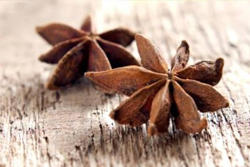 – Anise: The top of the bulb must be cut off. Each leaf must be separated and both sides of the leaf must be washed while brushing with a brush under running water. At that point one should make a visual inspection.
– Anise: The top of the bulb must be cut off. Each leaf must be separated and both sides of the leaf must be washed while brushing with a brush under running water. At that point one should make a visual inspection.
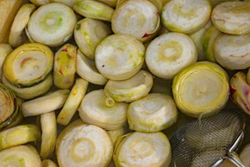 – Artichoke Bottoms
– Artichoke Bottoms
Wash before using. Make sure no leaves are attached.
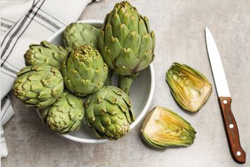 – Artichokes
– Artichokes
– Heart of Artichoke may not be used even with Hashgacha. This applies to fresh, frozen, canned or bottled.
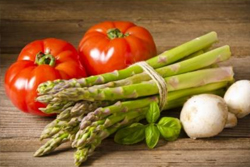 – Asparagus – Green
– Asparagus – Green
– Fresh raw Asparagus may only be used if the whole floret is cut off, the sides peeled and all brads have been removed. Ensure that every brad is taken off and each asparagus is totally smooth and then thoroughly rinsed.
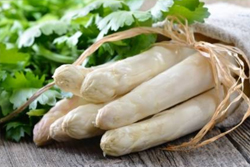 – Asparagus – White
– Asparagus – White
– Fresh White Asparagus may be used as is. Canned or jarred asparagus may only be used with a reliable hechsher.
 – Broccoli – Fresh.
– Broccoli – Fresh.
Only fresh broccoli stems may be used and must be washed with a brush under running water. Frozen broccoli with a reliable kosher certification may be used.
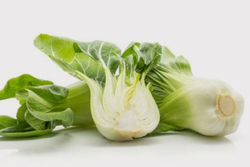 –Bok Choy:
–Bok Choy:
At this point we do not recommend using Bok Choy.
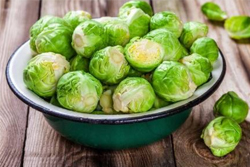 – Brussels Sprouts
– Brussels Sprouts
– Due to the difficulty of inspection of each brussel sprout leaf, these may not be used.
 – Cabbage Red or White
– Cabbage Red or White
Cabbage may be prepared one of the two following ways: The heads of cabbage must be placed in the freezer for 48 hours. Defrost the cabbage and wash each leaf under strong running water, ensuring that the water reaches all parts of the cabbage including folds and crevices. At that point the cabbage is acceptable. (This system is only good for cabbage that is going to be cooked and will not be used for salads).
OR
The four outside leaves of the cabbage must be removed and discarded. Cut the cabbage into quarters and separate all the leaves. Put into a solution of 2 Tbsp of soap to 1 liter of water. Swish the solution around to mix it well. Leave the cabbage in the solution for three to five minutes. Each side of the cabbage should then be sponged and rinsed off. Shake off excess water and dry.
 – Cauliflower
– Cauliflower
Fresh cauliflower may not be used.
Frozen cauliflower with a reliable kosher certification may be used.
 – Celery
– Celery
All leaves of the celery must be cut off and the stems washed with a brush under running water.
Both sides of the celery stem must be brushed to ensure that it is insect-free.
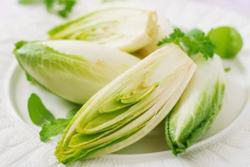 – Chicory
– Chicory
– May not be used.
 – Dill
– Dill
– Fresh dill may not be used. However if one would like to have a dill flavor, the dill is to be placed into a tightly woven cloth, tied and cooked. Thereafter the dill should be discarded.
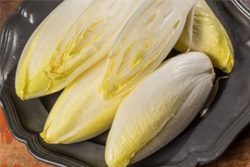 – Endives
– Endives
– Each leaf must be washed well under running water. This vegetable should not be confused with curly endives known as chicory.
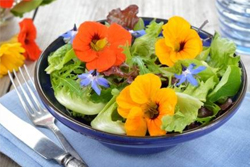 – Edible Flowers
– Edible Flowers
– Edible flowers may not be used.
– Fennel
The top of the bulb must be cut off. Make a solution of 2 Tbsp of soap to 1 liter of water and swish to mix it well. Place the fennel pieces in
the solution and leave for three to five minutes. Sponge each side of the fennel pieces then rinse. Excess water should be shaken off and dried.
 – Garlic
– Garlic
– Must be peeled and rinsed before use. When garlic is being peeled or prepared for the next day, add a small amount of salt, oil, sugar or vinegar.
 -Kale
-Kale
– May not be used.
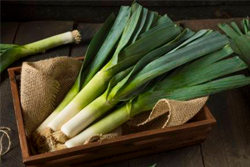 – Leek
– Leek
Cut off the root approximately less than 2 cm from the bottom. The green leaves on top should be cut off. The leek should then be split open down the side, spread out, each leaf washed and examined. To use the top green leaves for decoration, food-tying or any other purpose, the leaves must be split, washed on each side and brushed. They may then be used.
 – Lettuce
– Lettuce
Only iceberg, romaine and boston lettuce may be used and should be prepared as follows: The four outside leaves of the lettuce must be removed and discarded. Separate all the leaves. Make a solution of 2 Tbsp of soap to 1 liter of water and swish to mix it well. Place the lettuce in the solution and leave for three to five minutes. Carefully sponge each side of the lettuce as well as in the crevices and then rinse. Excess water should be shaken off and dried.
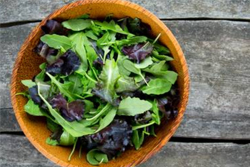 -Mesclun- may not be used.
-Mesclun- may not be used.
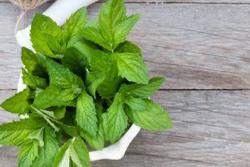 – Mint – Fresh
– Mint – Fresh
The essence from the leaves should be poured through a filter and may be used.
OR
Put the mint into a tightly woven cloth and into the hot water. Then discard the mint.
 – Button Mushrooms
– Button Mushrooms
– Button Mushrooms should be rinsed very well.
Portobello mushrooms often contain insects in the fan under the mushroom cap. Removal of the fan-like substance is recommended, this should be done with a spoon, followed by rinsing under strong running water.
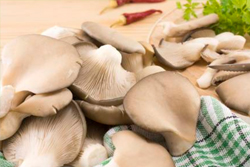 -Oyster Mushrooms
-Oyster Mushrooms
They are heavily infested and should not be used.
Shiitake mushrooms often contain insects in the fan under the mushroom cap. Removal of the fan-like substance is recommended, this should be done with a spoon, followed by rinsing under strong running water.
 – Onions
– Onions
– Must be peeled, the top layer taken off and the onion washed well. When onions are being prepared for the next day, add a small amount of salt, oil, sugar or vinegar.
 – Oregano
– Oregano
– Fresh oregano may not be used.
 – Parsley
– Parsley
– Fresh parsley may not be used. If parsley flavor is required, the parsley must be put into a tightly woven cloth, tied and cooked. Thereafter the parsley should be discarded.
 – Peppers
– Peppers
– All peppers must be cut open. A quick visual inspection should take place to ensure that there is no infestation.
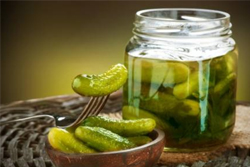 – Pickles – Dill
– Pickles – Dill
-Dill pickles require a reliable Kosher certification.
Dill pickles made with dill weed must be washed before being used. Dill pickles made with dill seed may be used as is
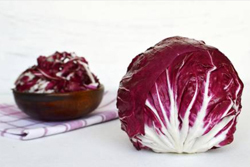 – Radicchio
– Radicchio
– Radicchio should be soaked in a soap and water solution and then should be washed well on both sides, leaf by leaf, and may then be used.
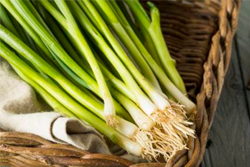 – Scallion
– Scallion
– Only the white part of the scallion may be used.
 – Snap Peas
– Snap Peas
-Have recently been found to be infested and
should not be used.
– Have recently been found to be infested and should not be used.
 Spinach – Fresh
Spinach – Fresh
– Fresh spinach may not be used. Frozen spinach with a reliable kosher certification may be used.
 – Sprouts- Rinse well with water as they are usually found to be clean.
– Sprouts- Rinse well with water as they are usually found to be clean.
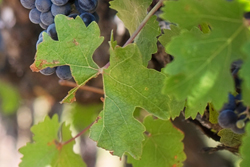 – Vine Leaves
– Vine Leaves
– The vine leaves should be placed into a solution of soapy water, sponged on both sides and then rinsed. Jarred vine leaves may not be used.